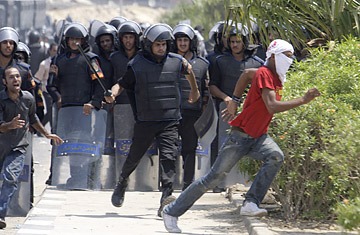
An Egyptian protester, right, runs away from a policeman chasing him in Cairo, Egypt on August 15, 2011.
(2 of 2)
Al-Din says that in May he helped to draft the service's first ever Code of Conduct and Code of Ethics. Its provisions include prohibitions on current and former operatives "to use their connections, or information that they gained from their positions, for private gain" and on conducting "any business that negatively impacts democracy."
But Morayef and other rights activists say the codes are too vague. "I'm not completely dismissive of what they're saying, but I also don't think they have the substance or the strategy, or the political will, to actually do things properly."
Al-Din admits that a serious makeover would take time. "Before the revolution, the regime was selecting the wrong people ... for all the government offices, and the only criteria they depended on was the loyalty of the candidates to the president and his people."
Some 100 of the ministry's officers are facing trial for violence during the uprising, and nearly 700 have been "retired". But security sources say many are appealing those administrative actions. Activists and victims' families claim that most perpetrators of violence have escaped with little more than reprimands. Ra'ya Mohamed Abdel Gawab, whose 17-year-old son Ahmed, was killed by security forces on January 28, says the police suspect, Tamer Saleh has kept his job, even with the trial underway. "He's supposed to be in jail, but he's not. It's because the system is still in place," she says.
The salaries of low-ranking officers also remain dismally low: around $116 a month for a corporal. And low pay, say critics, encourages the corruption that was rampant under Mubarak. Many of the lowest ranking forces are also poorly qualified conscripts.
"Before the revolution," al-Din explains, "there was nothing in writing explaining how far your tasks go. And we used to depend on the emergency law. Actually there were a lot of violent actions from the police service toward citizens. Like treating people in the police stations without respect, or neglecting [to provide] equal police service for everybody."
Since the early days of the uprising when police lines were overwhelmed by protesters and withdrew from the streets, the force has continued to come under fire, al-Din concedes, offering an anecdote about a traffic cop who was beaten by driver to claim that some officers are now afraid to do their jobs. On Monday, amid the rock-throwing outside the Police Academy hosting Mubarak's trial, On TV, an Egyptian network, captured footage of some police cowering behind colleagues with shields, rather than trying to stop the violence. In some instances, as during the trial's first session, officers were wounded.
State security created an image problem for the renamed institution, argues al-Din. "People look at the police institution as the stick or the tool in the hand of the regime."
But there's little happening to change the image of an institution still shrouded in mystery, whose operatives still patrol in plainclothes and rarely show identification. Phone tapping now requires a prosecutor's permit , but al-Din won't say whether the new regulations affected wiretaps already in place when they were adopted.
One tradition that hasn't changed is that many National Security and police officers still go to the United States for training that seemed to have little democratic impact on their style of policing. Al-Din hopes this will change. "I've been fighting against the currents for a long time, trying to transfer this ideology," he says. "For sure, I found resistance from some people; and other people were convinced. But they always used to say 'this is theory only — it's not applied to the reality'. And maybe, they were right somehow, because of the system."
